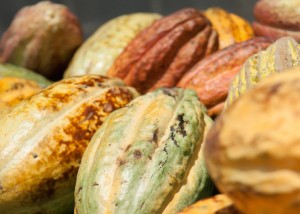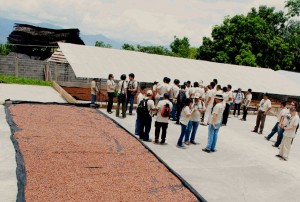 On October 9-12, Sustainable Harvest®’s 12th-annual Let’s Talk Coffee® conference outside Panama City will bring together more than 500 stakeholders throughout the specialty-coffee supply chain, including roasters, producers, and financiers. Leading up to the event, we’re profiling some of the people and elements that make Let’s Talk Coffee® an unforgettable, one-of-a-kind event. Registration closes September 22; sign up here.
On October 9-12, Sustainable Harvest®’s 12th-annual Let’s Talk Coffee® conference outside Panama City will bring together more than 500 stakeholders throughout the specialty-coffee supply chain, including roasters, producers, and financiers. Leading up to the event, we’re profiling some of the people and elements that make Let’s Talk Coffee® an unforgettable, one-of-a-kind event. Registration closes September 22; sign up here.
When Let’s Talk Coffee® kicks off next month, there will be a new event in tow: Let’s Talk Cocoa, which will bring together farmers, manufacturers, and other stakeholders from the specialty side of the cocoa industry for a series of workshops focused on cocoa production in Latin America. Let’s Talk Cocoa will focus on full value chain inclusion, helping to connect cocoa farmers with the global market in sustainable, quality-focused, and impactful ways.
 The event will include cocoa-producing cooperatives, leading chocolate companies, and many more organizations. Among the participating speakers will be John Kehoe, director of sustainability at California’s Guittard Chocolate. Kehoe is a specialty-cocoa veteran, having worked in importing and exporting, sourcing programs, and many other facets of the industry. He talked to Sustainable Harvest® about his many jobs in cocoa, the development of cocoa’s specialty side, and how it compares to the world of specialty coffee.
The event will include cocoa-producing cooperatives, leading chocolate companies, and many more organizations. Among the participating speakers will be John Kehoe, director of sustainability at California’s Guittard Chocolate. Kehoe is a specialty-cocoa veteran, having worked in importing and exporting, sourcing programs, and many other facets of the industry. He talked to Sustainable Harvest® about his many jobs in cocoa, the development of cocoa’s specialty side, and how it compares to the world of specialty coffee.
Q: What was your first job in the cocoa industry?
A: I started my adventure in cocoa in 1991, when I helped create a cocoa exporting company in Venezuela and served as managing director and partner. Venezuela had just eliminated a 17-year state monopoly of the cocoa sector, so it was a great opportunity to get into a commodity that the country is famous for—it produces high quality and has a tremendous history in cocoa. We jumped in with both feet and became one of the leading exporters of cocoa in Venezuela from 1991 to 1999, supplying Europe, the U.S. and Japan. It was an exciting time to get started in cocoa because the whole “single origin” concept was starting to take off. In 1998, Hugo Chavez got elected, and the short story is I wasn’t getting any younger and the country wasn’t getting any better. From there I moved to the Dominican Republic to join ED&F Man Cocoa; I managed their cocoa exporting operation for about two and a half years.
Q: What did you do when you left there?
A: I moved back to the U.S. and started my own specialty cocoa brokerage in 2002 called EcoTrade. At that time there was really no company in the U.S. specializing in specialty cocoa—it was a brand-new term. Coincidentally, I began looking to the specialty-coffee industry for inspiration. I joined the SCAA and went to its 2002 conference in Anaheim, when [Sustainable Harvest® founder] David Griswold was SCAA president and gave a keynote speech about Relationship Coffee.
 I took the SCAA 101 Cupping course, and it really opened my eyes and paved the way for me to understand cocoa from a different perspective and see what I believed was the way forward for the chocolate market. I ran EcoTrade in different forms from 2002 to 2008, and was able to pioneer unique, high-quality cocoa that was direct-trade fashion, and market it to the up-and-coming U.S. gourmet chocolate industry.
I took the SCAA 101 Cupping course, and it really opened my eyes and paved the way for me to understand cocoa from a different perspective and see what I believed was the way forward for the chocolate market. I ran EcoTrade in different forms from 2002 to 2008, and was able to pioneer unique, high-quality cocoa that was direct-trade fashion, and market it to the up-and-coming U.S. gourmet chocolate industry.
In 2008 I wanted to either grow the business or do something else, and I saw there were a lot of exciting things happening with these new young brands in the specialty chocolate space. I was interested in the project-based and experimental work with farmers and fermentation that was often proprietary. I wanted to help build one of these brands and had the opportunity to join one of my clients, TCHO, in 2008. I helped build the TCHOSource program, bringing technology and innovation to origin and rewarding farmers on the basis of quality and flavor. We did some really cool things, through grants from USAID to do work in Ecuador, the Democratic Republic, and later in Ghana. I learned a lot about the complex world of linking farmer groups and chocolate product development, formulation, and flavor.
In April of this year, I had the opportunity to join Guittard Chocolate as director of sustainability. Guittard is a much larger business, with a broader sourcing program and impact capabilities. We are building a sustainability platform based on quality and relationships, which Guittard is so good at as a family-owned business.
 Q: How do you think an event like Let’s Talk Cocoa will resonate with the cocoa industry?
Q: How do you think an event like Let’s Talk Cocoa will resonate with the cocoa industry?
A: It’s an interesting time in the cocoa industry, where specialty cocoa is really no longer a niche—it’s a major force and direction. I think at this time there’s a real need for the industry to understand different ways of approaching the business. Chocolate makers for generations have been operating on business models of sourcing that take into account flavor and quality. But what’s new is that the origins are more interested and engaged in this, and there’s more communication about flavor and experimentation going on between chocolate makers, farmers, and exporters. We’re really at an interesting time in terms of defining cocoa quality on the basis of flavor and not just on defects—in some ways, I think we’re where coffee was 15 or 20 years ago. The cocoa industry is still feeling its way through traceability, certifications, and how to really create the connectivity and the impact that the industry wants and needs with cocoa farmers. So with where we are in the industry, it’s an interesting time to have Let’s Talk Cocoa and discuss these issues and opportunities.
Q: Do you still look to specialty coffee for inspiration and guidance?
A: Yes, definitely. I think there’s a lot of opportunity for us to continue to learn from coffee. But the products are very different. First of all, flavors present themselves very differently in coffee and chocolate. In coffee you evaluate flavor, or the finished product, by tasting the bean in ground form. But you evaluate cocoa by tasting the liquor, or chocolate, where sugar and additional processing change and flavors begin to present themselves in very different ways. Even when tasting liquor, it’s very different from cupping coffee. The flavor’s a lot more intense, and the acidity and astringency are on a whole other level. It blows out your palate quickly.
And yet for all that, coffee and cocoa are very similar in so many ways—for one, they’re agricultural products grown in many of the same places. There’s so much we can learn from coffee, particularly in establishing standards. I believe there are also things that coffee can learn from cocoa, and hopefully we can discover more at Let’s Talk Cocoa.



.png)
